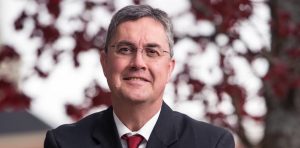Canada marks National Aboriginal Day by Eddie Campbell
http://www.unb.ca/fredericton/studentservices/academics/mwc/
Dear Members of the UNB Community,
Today, as Canada marks National Aboriginal Day, I am reminded of the treaties our ancestors signed in the 18th century, and that still bind us today. These treaties brought our peoples together in a spirit of peace and friendship, and even today these ideals provide the right direction for all of us.
As a university, the work we undertake transforms the potential of New Brunswick and its people. At UNB, this leads us in our commitment to reconciliation. The unresolved relationship between Aboriginal and non-Aboriginal people inhibits us from reaching our full potential as a society. In particular, we acknowledge the Truth and Reconciliation Commission’s Calls to Action, and the importance of the call to bridge the educational attainment gap within one generation.
The establishment of the Mi’kmaq-Wolostoqey Centre at UNB in 1981 was one step toward a stronger understanding and future together. The centre is helping to restore a First Nations’ perspective to students, rebuilding a damaged foundation. But our hope is that the values, and history, embraced with that perspective will become better known across our university and that our efforts will enrich greater public understanding of Aboriginal cultures.
We are fortunate to have the help of people like centre director David Perley and UNB elder in residence Imelda Perley. Elder Perley is working to keep the Mi’kmaq and Wolostoqey languages alive, partly through ensuring that those languages are taught in New Brunswick schools.
Just this week, Elder Perley was awarded the Sovereign’s Medal for Volunteers by Governor General David Johnston in a ceremony at Rideau Hall for her work and determination in keeping her culture’s traditions alive. As part of her ongoing efforts in education and outreach, she has also agreed to serve as a Canada 150 Ambassador.
In our effort to promote greater understanding of our shared past, high-profile events across both our campuses open with a public acknowledgement that the lands our campuses occupy are traditional Wolastoqey territory.
UNB is home to the Urban Aboriginal Knowledge Network Atlantic, a community-driven network that supports research aimed at fostering wolipomawsuwakon – the good life – for urban Aboriginal peoples. This goal is achieved through funding high-quality, policy-relevant research that brings together perspectives from academia, government and the urban Aboriginal community.
As part of its work, UNB Truth and Reconciliation Calls to Action Committee – formed to examine how our community should respond to the findings of the Truth and Reconciliation Commission – has engaged in conversation with the UNB community and the wider public.
The committee has been responsible for bringing in notable speakers to UNB, including Charlene Bearhead, education lead at the Truth and Reconciliation Commission National Centre in Winnipeg, and Kevin Lamoureux, a dedicated educator who is strengthening The University of Winnipeg’s mission to reach out to non-traditional students and provide more pathways into post-secondary education.
Our Mi’kmaq-Wolostoqey Centre is also the force behind UNB’s annual powwow, held for the third time at UNB this past April. Askomiw (Beyond) 150: Celebration of Resilience brought together our community with members of indigenous communities in a celebration of cultural resilience.
We are right to be proud of all that has been accomplished, and I am grateful to those whose determination and commitment have brought us to where we are today.
There is, of course, more that we can – and must – do as a university community to build on this, to reach reconciliation. At UNB, through our commitment to education and research, we bear this responsibility.
Sincerely,
Eddy Campbell
President and Vice-Chancellor
